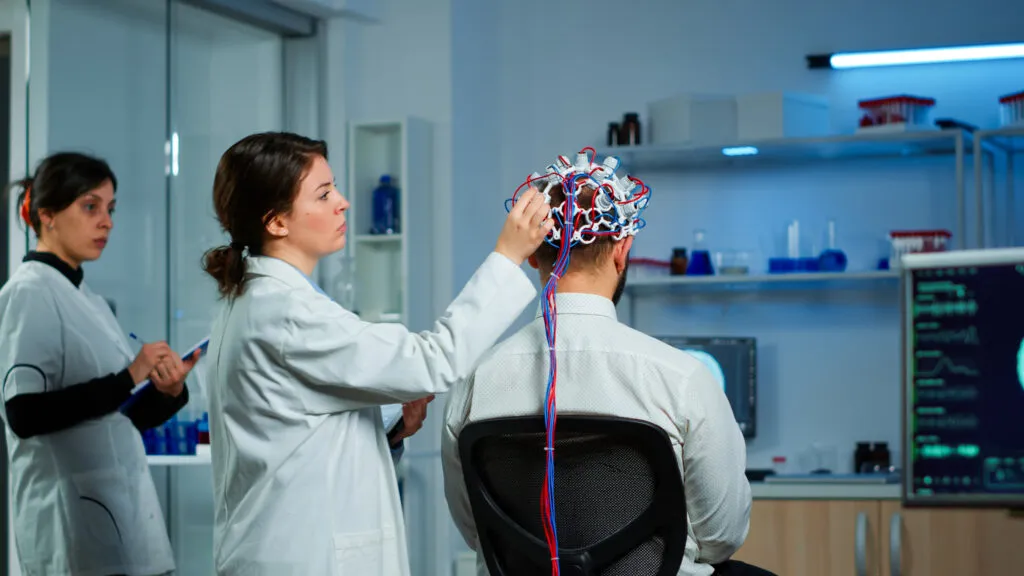Ai In Mental Health And Revolutionizing Mental Healthcare
Ai In Mental Health :
The Ai In Mental Health landscape is experiencing a transformative shift with the rise of artificial intelligence (AI). This powerful technology holds immense potential to address the global mental health crisis, offering solutions for diagnosis, treatment, and accessibility.
AI’s multifaceted role in mental healthcare can be explored through three key areas:
1. Enhanced Diagnosis and Screening:
- Data-driven insights: AI algorithms can analyze vast amounts of data, including electronic health records, speech patterns, facial expressions, and even social media activity, to identify potential mental health issues. This allows for earlier detection and intervention, leading to better outcomes.
- Precision medicine: AI can assist in creating personalized risk assessments and tailoring treatment plans based on individual characteristics and needs. This data-driven approach can lead to more effective and targeted interventions.
- Chatbots and virtual assistants: AI-powered chatbots can provide initial assessments, answer basic questions, and offer preliminary support, freeing up time for human professionals to focus on complex cases.
2. Personalized Treatment and Support:
- Therapeutic chatbots: These AI-powered chatbots can offer ongoing support, monitor symptoms, and guide users through evidence-based therapeutic techniques like cognitive behavioral therapy (CBT).
- Digital companions: Virtual companions can provide a safe space for individuals to express themselves, practice mindfulness exercises, and receive emotional support through AI-powered interactions.
- Mental health apps: AI-powered apps can offer personalized recommendations for managing stress, anxiety, and depression, providing users with tools like journaling prompts, relaxation techniques, and sleep guidance.
3. Increased Accessibility and Affordability:
- Remote care: AI can enable mental health professionals to reach individuals in remote areas or with limited mobility through virtual consultations and teletherapy sessions. This can significantly increase access to much-needed care.
- Scalability: AI-powered tools can be readily scaled to reach a wider population, addressing the current shortage of mental health professionals and increasing service availability.
- Cost-effectiveness: AI-powered solutions can be less expensive than traditional therapy, potentially lowering the overall cost of mental healthcare and making services more affordable.
However, the integration of AI into mental healthcare is not without its challenges:
- Ethical considerations: Issues surrounding data privacy, bias in algorithms, and potential job displacement for mental health professionals need careful consideration and ethical frameworks.
- Over-reliance on technology: AI should not replace human interaction in mental healthcare. It should serve as a complementary tool, not a substitute for the vital role of human connection and empathy.
- Limited effectiveness for complex cases: AI is still under development, and its effectiveness for complex mental health conditions remains limited. Human expertise and judgment are crucial for diagnosis, treatment planning, and ongoing support.
The future of AI in mental healthcare requires a collaborative approach:
- Collaboration between AI developers, mental health professionals, and ethicists is essential to ensure responsible and ethical development and implementation of AI-powered solutions.
- Robust regulatory frameworks are needed to address data privacy concerns and ensure the safety and efficacy of AI-powered solutions.
- Continuous research and development are crucial to improving the accuracy and effectiveness of AI for mental health applications.
conclusion:
AI holds immense potential to revolutionize mental healthcare by enhancing diagnosis, providing personalized treatment, and increasing accessibility. However, it is crucial to address ethical concerns, ensure responsible use of AI, and maintain the human element of care. By harnessing the power of AI thoughtfully and ethically, we can create a future where everyone has access to the mental health support they need.
FAQs:
Can AI replace therapists?
No, AI is not meant to replace therapists. It can act as a valuable tool for therapists, offering support by handling initial assessments, monitoring symptoms, and providing readily accessible resources. However, the human connection and personalized care provided by therapists remain irreplaceable in mental healthcare.
3. Are AI-powered therapy apps effective?
These apps can offer personalized tools and support for managing stress, anxiety, and depression. While they can be helpful, they shouldn’t be considered a sole solution for complex mental health challenges. Consulting a mental health professional is crucial for personalized treatment plans and ongoing support.
Is AI-powered mental healthcare safe?
Ethical considerations around data privacy and bias in algorithms are critical concerns. It’s essential to choose tools from reputable sources with strong data security measures and ensure they are developed in collaboration with mental health professionals to minimize bias.
What are the future possibilities of AI in mental healthcare?
AI has the potential to further personalize treatment plans, improve accessibility by reaching remote areas, and reduce the cost of mental healthcare. However, ongoing research and development, alongside ethical considerations and collaboration with mental health professionals, are crucial for responsible and effective implementation.
Must read:
What Causes Numbness in Hands While Sleeping?
Secrets of DMT Meditation: What Is DMT Meditation and How Does It Work?
Benefits of Cirkul Water Bottle for On-the-Go Hydration | 2023
Why Does Conjunctivitis Eye Infection Happen? | Pink Eye | 2023
Exploring the Exciting World of AI Technology | 2023
Top 8 Japanese Dog Breeds: A Closer Look at the Most Beloved and Iconic Breeds from Japan
Reason Behind Pollution in Delhi in Winter Season: Causes and Solutions
A Festival of Lights and Togetherness in India
Why is Quantum Computing Useful For Optimization Problems? | Reshaping Industries | 2023
Do You Know? – How to apply for overseas education loan in India
New Heights: The Race for America’s Tallest Building | 2024






